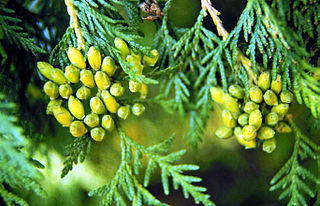
Thuja occidentalis, also known as northern white-cedar, eastern white-cedar, or arborvitae, is an evergreen coniferous tree, in the cypress family Cupressaceae, which is native to eastern Canada and much of the north-central and northeastern United States. It is widely cultivated as an ornamental plant.

Pinus occidentalis, also known as the Hispaniolan pine or Hispaniola pine, is a pine tree endemic to the island of Hispaniola.
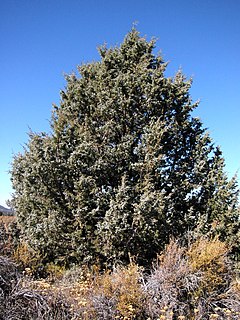
Juniperus occidentalis, known as the western juniper, is a shrub or tree native to the western United States, growing in mountains at altitudes of 800–3,000 meters (2,600–9,800 ft) and rarely down to 100 m (330 ft). It is listed as Least Concern on the IUCN Red List because it is a widespread species with an increasing population.
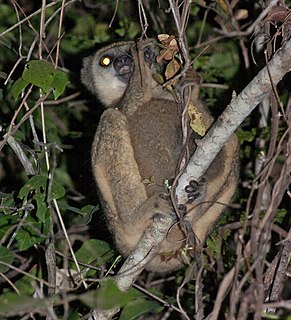
The western woolly lemur or western avahi is a species of woolly lemur native to western Madagascar, where they live in dry deciduous forests. These nocturnal animals weigh 0.7-0.9 kg. It is a folivorous species.
Lacewood is a common name for the wood produced from a number of different trees, with mostly a striking appearance of their "lace-wood“, which gets its name from the lace like pattern: These include:
The western shrew mouse is a species of rodent in the family Muridae. It is found in West Papua, Indonesia and Papua New Guinea.

The pine toad is a species of toad in the family Bufonidae. It is endemic to Mexico and found on the Central Mexican Plateau.
Dermophis occidentalis is a species of caecilian in the family Dermophiidae. It is endemic to south-western Costa Rica and occurs in the Pacific lowlands and premontane slopes, extending to the western part of the central valley. Its taxonomic status is unclear.

The Tai forest tree frog, Leptopelis occidentalis, is a species of frog in the family Arthroleptidae. It is found in Liberia, southern Ivory Coast, and Ghana. Records from Nigeria are controversial and may refer to other species, possibly Leptopelis boulengeri.
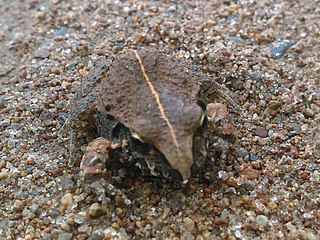
Craugastor occidentalis is a species of frog in the family Craugastoridae. It is endemic to Mexico. Its natural habitat is subtropical or tropical dry forests.

The southern banana salamander is a species of salamander in the family Plethodontidae. It is found in Guatemala, Honduras, and Mexico. Its natural habitats are subtropical or tropical moist lowland forests, subtropical or tropical moist montane forests, arable land, and plantations . It is threatened by habitat loss.
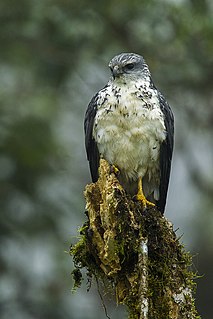
The grey-backed hawk is a species of bird of prey in the family Accipitridae. It is found in Ecuador and far northern Peru. Its natural habitats are subtropical or tropical dry forest and subtropical or tropical moist lowland forest. It is threatened by habitat loss.

The Spanish mole is a species of mammal in the family Talpidae. It is found in Portugal and Spain.

The Gila topminnow or charalito is a species of fish in the family Poeciliidae. It is found in Mexico and the United States.
Euplassa isernii is a species of plant in the family Proteaceae. It is endemic to Peru.

Euplassa is a genus of flowering plants in the protea family. It is native to tropical South America, including Bolivia, Brazil, Colombia, Ecuador, French Guiana, Guyana, Peru, Suriname, and Venezuela.
Chalybea occidentalis is a species of plant in the family Melastomataceae. It is endemic to Cauca, and Risaralda in Colombia.
Roupala pinnata is a species of plant in the family Proteaceae. It is endemic to Peru.

I. M. Johnston, was a United States botanist. He studied at Pomona College in Claremont, California and at Harvard University. His plant collections are housed in the Rancho Santa Ana Botanic Garden, in Claremont, and also in the Gray Herbarium of Harvard University.

The western round-eared bat is a bat species found only on the Pacific coast of northwestern Ecuador.














